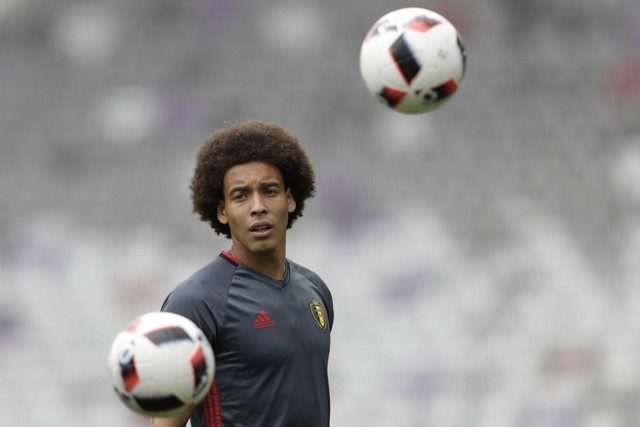One French columnist referred to him as Belgium’s Swiss Army Knife. What was meant was that, in a team of many virtuosos, Axel Witsel is all-purpose, a player with tools to solve every problem. His tackles have a sharp cutting edge, too, so sharp they have on occasion put him in trouble.
According to his head coach, Marc Wilmots, Witsel is pretty much the first name on Belgium’s teamsheet, straight in at the centre of midfield while the outlying roles are filled with famous names, backed up by equally famous ones on the bench. Eden Hazard is Belgium’s captain, in the absence of the injured Vincent Kompany. Witsel is Belgium’s general, with extra stripes and epaulettes on his shoulders when Kompany is unable to provide his instinctive leadership.
Yet, while Witsel’s metronomic consistency and care in possession is valued by Wilmots, he divides opinion among pundits and public.
At Euro 2016, where Belgium have soared in two matches – against Hungary and Republic of Ireland – and looked rather less than the sum of their parts in their two others, against Italy and Sweden, Witsel has maintained high standards. The data-collectors who monitor distribution have him clocking in with a 92 per cent accuracy for his passing. The doubters sneer that too many of those passes go sideways, or behind him, and that he slows the play down.
His champions would argue that this a Belgium who need the pause and certainty of a strong anchor man. To Wilmots, “Axel makes the others play better.”
If his partner in the centre of midfield is Radja Nainggolan, you notice the Roma man’s pugnacity but it needs to be offset by Witsel’s positional discipline; if Marouane Fellaini is with him, there is aggression, certainly, and extra height. But Witsel can match Fellaini for most things. Against Ireland, he offered a reminder that if a well-timed leap to meet a cross is required, Witsel can glide into the sorts of places Fellaini vaults into. He measured his run to meet the cross of Thomas Meunier perfectly for Belgium’s second goal of the three that afternoon.
Witsel, named man of the match against the Irish, the victory that launched Belgium’s championship after they had lost to Italy, had started the move that led to that goal. He had done so with a square pass, his critics might note.
The notoriety may have taken longer to fade because Witsel’s club career, has not, unlike Fellaini’s or Hazard’s, or most of the Belgium squad’s, taken him to one of the leagues where the highs of his more mature years are watched, live or via highlights, widely in his native country. His performances each weekend for Zenit Saint Petersburg are appreciated in Russia; in Belgium he is less visible.
Yet in many ways, Witsel, 27, has been a pathfinder for his country’s so-called “Golden Generation”. He won his first senior cap at 19, scoring on his international debut. In the same summer, 2012, that Hazard moved from Lille to Chelsea for close to €40 million (Dh162.3m), Witsel joined Zenit for a marginally higher fee, from Benfica.
There is growing interest, including from Chelsea, in bringing his authoritative midfield play to the Premier League where so many of his gifted compatriots earn their living.
Friday night, he has an important task. If Wales chose to go into the quarter-final with Gareth Bale deployed just off a centre-forward – Sam Vokes or Hal Robson-Kanu – Witsel will be required to monitor the most potent weapon the Welsh have. Aaron Ramsey, supplier of telling through-balls for two of Wales’ decisive goals so far in France, will also need Witsel’s attention.
He has the firm trust of Wilmots, and the helpful memory of having kept Lionel Messi pretty quiet at the same stage of the last World Cup.




